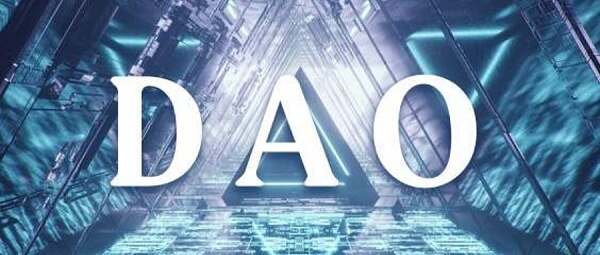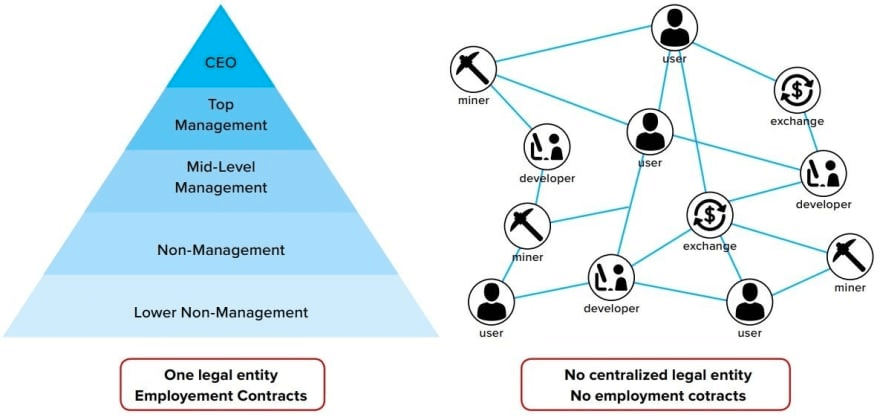Tiền pháp định
Các loại tiền điện tử
Không có kết quả cho ""
Chúng tôi không thể tìm thấy bất cứ thứ gì trùng khớp với tìm kiếm của bạn.Hãy thử lại bằng một cụm từ khác.
How does DAO Work?
A Decentralized Autonomous Organization (DAO) is an entity with no central leadership. Decisions get made from the bottom-up, governed by a community organized around a specific set of rules enforced on a blockchain.
DAO operates without hierarchical management and can serve a variety of purposes. These organizations enable freelancer networks where contracts pool their funds to pay for software subscriptions, charitable organizations where members approve donations, and group-owned venture capital firms.

What is DAO?
A DAO is essentially self-contained. Based on a set of rules that are put in place at the start and then changed over time by stakeholders or an algorithm. It accomplishes tasks by utilizing a series of "smart contracts," which vary from traditional legal contracts in that they live and operate autonomously via the internet without the need for human interaction. Despite its autonomy, some activities, such as contacts with the legal system, are impossible for a DAO to execute on its own. Furthermore, because to its independent activity, a DAO can operate outside of a normal organization's administrative framework. Instead of top-down management, each member has an equal say in the organization's decisions, or all management can be handled by a computer program independent of the founding party's authority. In any case, no one person or party makes decisions within the DAO.
How Does DAO Work?
DAO is based on smart contracts, which execute automatically when certain conditions are met. The smart contract defines the organization's rules, which can only be altered through a vote. It can also send and receive money without the need for a human intermediary. Members can vote on rules and directly spearhead company changes after purchasing DAO tokens, which are typically purchased with Ethereum. The tokens are important in voting because any member should theoretically be able to participate. This encourages an organizational structure that is more horizontal and transparent.
A DAO's rules and regulations are written in the source code. Rather than being written on paper, thousands of nodes collaborate to execute these rules and regulations using a consensus-based algorithm. They are always willing to change if the community votes in favor of it. DAOs do not require third parties because smart contracts automate much of the decision-making process and reduce human errors.
DAO is Useful in funding situations, such as dispensing funds automatically when a certain percentage of members agree to fund a project. All the changes are approved only after a certain number of members vote in favor of them, encouraging more significant input from all members and ensuring unrestricted cooperation within the organization. This is accomplished without the members' knowledge or consent. Changes are approved only after a certain number of members vote in favor of them, encouraging more significant input from all members and ensuring unrestricted cooperation within the organization. This is accomplished with members who do not know or necessarily trust one another. Furthermore, there is no need for trust. Everything that happens is completely transparent, and all transactions are recorded on an immutable ledger.
What is the Difference between DAO and Traditional Organization?

DAOs differ from traditional organizational forms in their decentralized structure and lack of central planning, sharing the treasury and raising equity by issuing tokens, attracting anonymous investors and workers with a common goal. In terms of incentives, DAO effectively combines the incentive mechanism between work and rewards (native tokens), effectively reducing the supervision of traditional senior management, and enabling senior management to deal with more important things. In terms of contributions, you will not lose your old rights by switching jobs, all efforts will be permanently stored on the blockchain.
All members of a DAO follow the rules embedded in the smart contracts code. The operations of DAOs are fully transparent and global, whereas the operations of traditional companies are not always global, only the organization knows what is happening. All members of a DAO must vote for any changes to be made.
Once a DAO is operational, all decisions about where and how funds are spent are made by consensus. This requires a secure structure that allows each investor to configure the organization.
In the future, DAOs have the potential to completely transform corporate governance. While the concept matures and the legal gray area they operate in is cleared, more and more organizations may adopt a DAO model to help govern some of their activities.
Tìm chúng tôi trên:
X (Twitter) | Telegram | Reddit
Tải xuống ứng dụng CoinCarp ngay bây giờ: https://www.coincarp.com/app/
Up to $6,045 Bonuses
Sponsored
Join Bybit and receive up to $6,045 in Bonuses! Register Now!